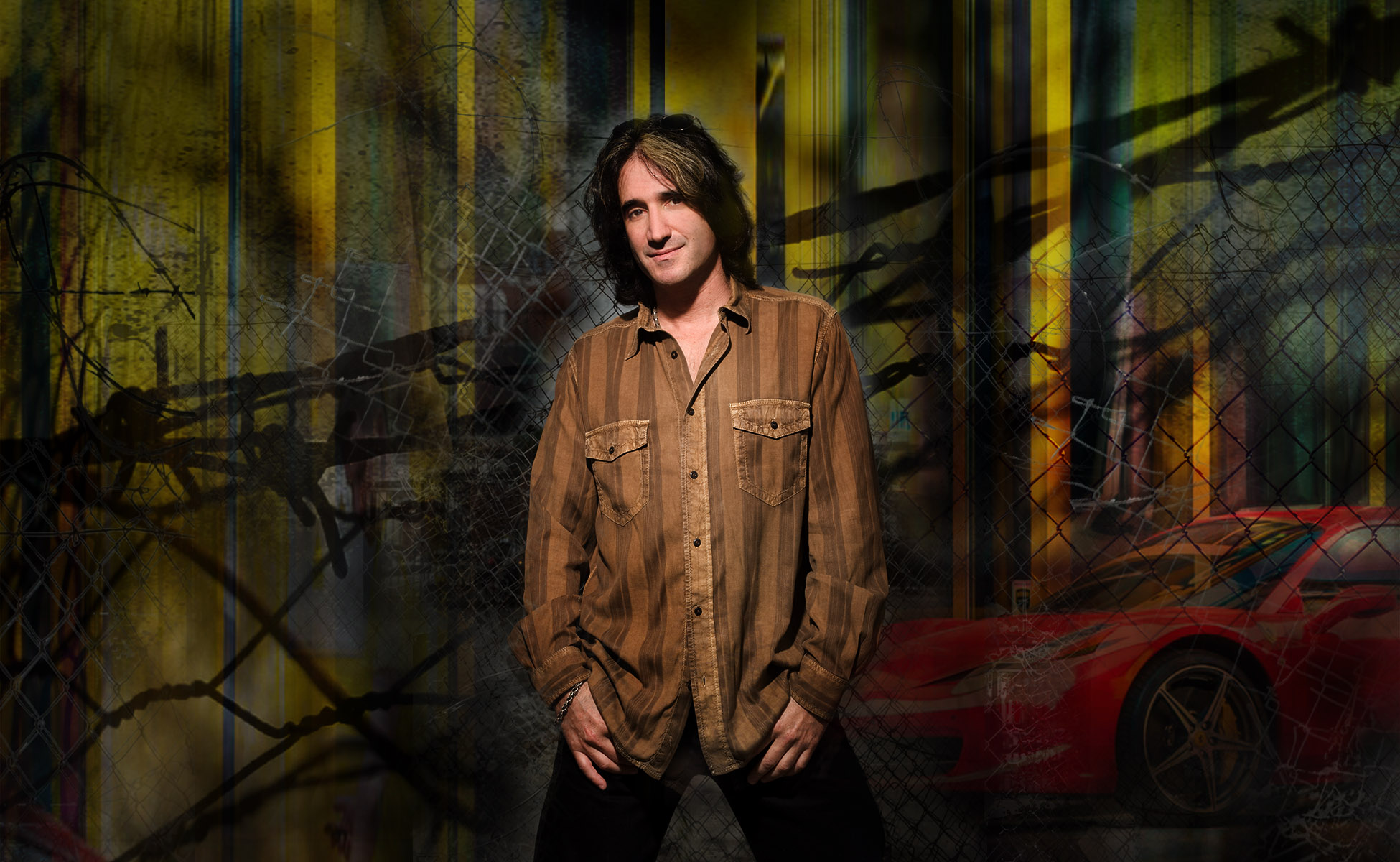



BIO
BIO
Fast. Sleek. Dynamic. Inspiring.
Fast. Sleek. Dynamic. Inspiring. These are just a few words that have often been used to describe the Ferrari automobile. Similar plaudits have also been used to describe ace guitarist/producer/songwriter/artist, Marc Ferrari and as his namesake implies, this Ferrari is in a class all his own. As a member of Goldmountain/MCA recording artists Keel and Cold Sweat, Marc established himself as one of rock’s brightest rising stars while earning the respect and admiration of his peers.
Marc was born near New York City and relocated upstate where he stayed through graduation. It was here that he first cut his teeth on the bar circuit of Western New York. Though under-aged at the time, this didn’t stop him from pursuing his life-long passion of performing. By 19, already a veteran of the club wars, he moved to Boston for greener and more lucrative pastures which quickly earned him a reputation as a dynamic performer/writer playing on studio sessions with various artists and producers such as former Rolling Stones producer Jimmy Miller. Unsatisfied with his musical urges while recording/performing in the New England area, he sensed something was missing...his calling was elsewhere.
In January 1984 Marc took a plane to Los Angeles never to look back, for it was there that his destiny was waiting. A chance meeting with long-time friend and correspondent, Mike Varney (Shrapnel Records president and all-around metal guru) changed his life forever. Mike told Marc that Ron Keel was starting his own project and was looking for hungry, hard-working people to share his vision. Marc called Ron the same day and the partnership was formed. Almost immediately the band was selling out all over Los Angeles at the Roxy and the Troubadour, then larger venues such as the Country Club. These shows brought the band to the attention of Goldmountain Records and future producer Gene Simmons of KISS. While awaiting a decision from the major labels, the band decided to waste no time and went into the studio to record their first LP for Mike Varney’s label. Recorded in just eight days, Lay Down The Law has become a cult classic among rock aficionados, and to this day is still selling strong.
In August 1984 the band signed to Goldmountain Records and entered the renowned Record Plant Studios with Gene Simmons to record their epic The Right To Rock LP. This album, a virtual audial avalanche, sky-rocketed the band to instant acclaim upon its release in January 1985. Anti-censorship groups quickly aligned themselves with the title track and its message garnering the song a battle-cry of thousands across the country.
The band toured all year in support of the LP, teaming up with such groups as Loudness, Accept, and Helix. The barnstorming paid off handsomely, and the group was voted “Best New Band” in not one, or two, but THREE of the nation’s biggest rock magazines: Circus, Metal Edge, and Rock Scene, beating out such luminaries as Bon Jovi, Dokken and Metallica. Capping off a brilliant year, the boys went back into the studio once again with Gene Simmons to record their 3rd LP, The Final Frontier.
Just days before its release in early spring 1986, the space shuttle Challenger tragedy shook the world, and the band paid its tribute to the fallen heroes by dedicating the album to them. Putting the tragedy behind them, the band took the world by storm. They toured Europe for the first time as special guests of Dio. They criss-crossed America with Krokus, Quiet Riot and Queensryche. They were invited to play at the annual Texxas Jam with Van Halen for 81,000 people. They did stadium dates with Aerosmith, and to top it off, a whirlwind tour of Japan, where the band received the biggest welcome one could hope for... complete with Beatlemania-type scenes at the airport and hotels. They returned to the studio in December... this time with Michael Wagener (Dokken, Great White, Accept, Alice Cooper) at the helm.
Upon completion of the album, Marc took on some other projects to keep busy. He produced a track for up and coming Texas rockers, Pantera and through his involvement, helped them to land a label deal. He took on a project from a Japanese advertising agency who had heard of his songwriting prowess and produced/recorded 12 songs for international use. He wrote 3 songs with ex-KISS skinbasher Peter Criss. He designed his own guitar which Peavey Corp. manufactured for him, and Peavey went as far as to purchase the rights to some of his design modifications. He was clearly starting to expand his horizons, welcoming all new challenges in front of him.
The 4th LP, self-titled Keel, was released in May 1987. That summer, the boys landed the gig of the decade - the last leg of the Bon Jovi Slippery When Wet tour. How did they get that prestigious slot over countless other bands? A little luck and a lot of initiative made it happen. Marc himself explains, “I had known Jon (Bon Jovi) for a couple of years. He had always been real cordial to me whenever we met, so I kept in touch with him whenever he was in town. I ran into him at a club in L.A., just after the release of our Keel LP. We had a couple of drinks, and the next day I played him some of the tracks off the album. One thing led to another, and before I knew it, we were asked to open up the last leg of his tour. It all comes down to establishing a good rapport among your peers and associates. I like to build bridges, not burn them.”
Following the ultra-successful Bon Jovi tour, the band returned to the clubs, grinding their way across the country for most of the summer and culminating with a Christmas show at their old stomping grounds, the Country Club in Los Angeles, a well deserved “welcome home” for the local heroes.
“I had known Jon (Bon Jovi) for a couple of years. He had always been real cordial to me whenever we met, so I kept in touch with him whenever he was in town. I ran into him at a club in L.A., just after the release of our Keel LP. We had a couple of drinks, and the next day I played him some of the tracks off the album. One thing led to another, and before I knew it, we were asked to open up the last leg of his tour. It all comes down to establishing a good rapport among your peers and associates. I like to build bridges, not burn them.”
Following his departure from Keel in 1988, Marc diversified his interests in the music business. He started a new band which would eventually be signed to MCA called Cold Sweat. The highly-praised, but sadly overlooked debut album from Cold Sweat, entitled Break Out was released on MCA Records in June 1990. That summer, they supported Dio and Love/Hate on their U.S. tour, as well as being invited as special guests to Whitesnake on the Monsters of Rock festival in Mannheim, Germany. After a solid year on the road, the band returned to Los Angeles, only to find that their A&R rep at MCA had been fired. Due to lack of label support, the group disbanded in 1991. Marc concentrated on writing, producing, and music publishing. He co-wrote a song entitled “5-Card Stud” with former KISS guitarist Ace Frehley, which appeared on Ace’s album Trouble Walking. He also wrote a song with ex-Loudness vocalist Minuro Niihara which appeared on his solo album in Japan.
Marc began doing clinics for St. Louis Music, representing Alvarez electric guitars and the fine line of Crate amplifiers as well, quickly becoming one of the most proficient and respected clinicians in the country. In Summer 1991, Marc was asked to be the guitarist in the now-classic Wayne’s World. Having worked with director Penelope Spheeris for a Keel video, Marc had developed a relationship which resulted in his first major motion picture appearance. Wayne’s World went on to become one of the most popular movies of its generation, and Marc was asked back to reprise his role of Tia Carrere’s guitarist in the smash sequel, Wayne’s World 2. He also appeared in the hit TV shows Murder She Wrote and Step By Step as well.
In 1992 he formed MasterSource, which became one of the most successful independent music publishing companies in the world, licensing over 4,000 songs to film and television. 1992 also saw the formulation of his next band Medicine Wheel, which went on to release its debut album entitled First Things First via the Dream Circle label in Europe and Alfa/Brunette in Japan. In November 1994 the band played in Japan and released 2 other titles: Immoral Fabric and Small Talk.
1995 saw the release of Marc’s first ever solo effort entitled Marc Ferrari & Friends: Guest List. This exciting release features many of Marc’s friends from the rock community, and showcases his diverse writing and playing talents. Including performances from MSG’s Robin McAuley, Autograph’s Steve Plunkett, Medicine Wheel’s Michael Mulholland, Blackthorne’s Bob Kulick, and Black ’n Blue’s Tommy Thayer, Guest List is a first-rate collection of first-rate talent, and another page in the ever-expanding book of Marc Ferrari’s illustrious career.
In 1996 the Summer Olympics came calling, and Marc responded by writing 2 theme songs that were used for video productions, “Capture The Dream” and “Chance Of A Lifetime.” In addition, 9 other songs from his catalog were used in various athlete profiles and special segments. Later that year, he was presented with a special achievement award from the National Academy of Television Arts and Sciences for his contributions to the 1996 Emmy-award winning daytime soap opera Guiding Light.
In 2003 Marc released his 2nd solo album entitled Lights, Camera, Action, a collection of songs specifically written for film and TV projects and also became a published author with the release of his book Rock Star 101, published by Allworth Press. A unique look at the world of music from a performing artist’s point of view, the book offers valuable first-hand advice regarding the business aspect of playing in a band combined with many anecdotal road stories that only a rock star can tell. It received many glowing reviews and Marc did several high-profile book signings to promote it.
In January 2007 MasterSource was acquired by Universal Music Publishing and is now part of the Universal Publishing Production Music family alongside Killer Tracks and FirstCom. Marc ran the MasterSource division for 5 years, stepping down in 2012 to explore new opportunities in both the production music space and the angel investment community.
Few musicians have been able to accomplish the broad achievements that Marc Ferrari has done in such a short time. As new challenges are presented and conquered, one thing is certain... Marc Ferrari is just getting started!

CHRONOLOGY
CHRONOLOGY


